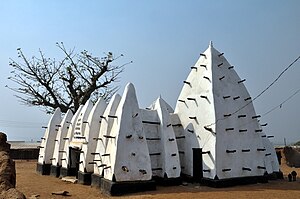
Back الإسلام في غانا Arabic ঘানায় ইসলাম Bengali/Bangla Islam in Ghana English Islam au Ghana French Musulunci a Ghana Hausa Islam di Ghana ID Islam in Ghana Dutch Ислам в Гане Russian Uislamu nchini Ghana Swahili Ганада ислам Tatar
| Subclass of | Islam on the Earth, religion in Ghana |
|---|---|
| Facet give | Ghana |
| Country | Ghana |
Na Islam be de first Abrahamic monotheistic religion make e reach Ghana. Today Islam be de second most widespread religion insyd de country after Christianity. Ein presence insyd Ghana dey date back to de tenth century. According to de Ghana Statistics Service Population and Housing Census (2021), de percentage of Muslims insyd Ghana be approximately 20%.[1]
According to 2020 report by de Association of Religion Data Archives, 63.5 percent of Muslims insyd Ghana be Sunni.[2][3] De Maliki school of jurisprudence be most prevalent, although Yusuf Solih Ajurah ein reformist advocacy insyd de 1960s see rise in de popularity of de Hanbali school.[4] Sufism, once widespread, get greatly diminish ova de years. Howeva, de Tijaniyya den Qadiriyya Sufi orders dey still exist insyd Ghana.[5]
De spread of Islam insyd West Africa dey begin for de ancient Ghana insyd de ninth century na mainly ebe de result of de commercial activities of Muslim insyd North Africa. De empires of Mali den Songhai, wey na e succeed Ghana insyd western Sudan, adopt de religion. Islam enter modern Ghana thru de northern lands around de fifteenth century. De Mande people allow merchants den clerics make dem enter de region. Na influx of Hausa Muslim merchants affect de northeastern sector of de country dey begin insyd de 16th century den second wave of immigrants wey dey flee de jihad of Osman Dan Fodio insyd northern Nigeria during de early 19th century.[6]
Despite de tensions insyd de Middle East, North Africa den Nigeria since de mid-1970s, relations between Muslims den Christians be excellent. De Islamic Parliamentary Authority often dey negotiate make dem enforce religious, social den economic laws wey dey affect Muslims. De council sanso be responsible make dem dey organize de pilgrimage to Mecca for believers wey dey fi afford de journey. Despite dese achievements, na de council no dey succeed make dem dey take initiatives make dem raise de level of Islamic schools beyond providing basic Quranic education. Perhaps dis dey explain de economic den technological gap between Muslims den non-Muslims.[7]
- ↑ "Ghana". United States Department of State. Retrieved 2023-09-16.
- ↑ The World's Muslims: Unity and Diversity (PDF) (Report). Pew Research Center, Forum on Religious & Public life. August 9, 2012. pp. 29–31. Archived (PDF) from the original on February 25, 2021. Retrieved November 21, 2020.
- ↑ Owusu-Ansah (1994), "Religion and Society".
- ↑ Mohammad Saani, Ibrahim (2011). The decline of Sufism in West Africa: Some factor contributing to the political and social ascendancy of Wahhabist Islam in Northern Ghana. Montreal: Institute of Islamic Studies - McGill University. Archived from the original on 2014-12-15. Retrieved 2014-12-12.
- ↑ "300 Year Stay In Ghana Does Not Make You A Ghanaian". GhanaWeb. -001-11-30T00:00:00+00:00. Retrieved 2024-03-16.
- ↑ "NDC's Phanton Sympathy For The Zongo And Northerners". GhanaWeb. 2013-07-31. Retrieved 2024-03-16.
- ↑ "Zongo:the eleventh region?". GhanaWeb. 2013-08-04. Retrieved 2024-03-16.
